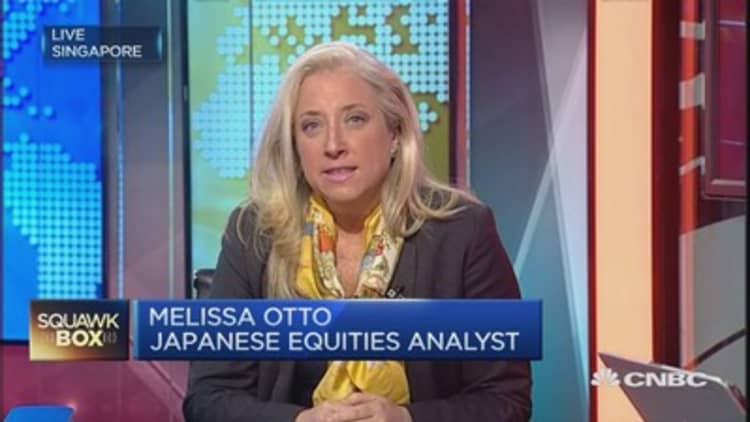The race for a devalued currency is set for a new set of twists and turns this summer as analysts contemplate how the U.S. Federal Reserve will deal with a dollar that is far stronger than its global counterparts.
According to Societe Generale's Albert Edwards, the spark for this new round of "currency wars" – whereby countries manipulate foreign exchange to gain a global advantage -- is the , which fell to its weakest against the greenback since 2002 on Tuesday.
The uber-bearish strategist predicts that "off the scale" quantitative easing (QE) by the Bank of Japan could see it continue to weaken and "set off another round in the global currency war." He adds that this could have a detrimental effect on major economies around the world.
"As the yen drags down other regional currencies, and the (Chinese) renminbi is forced to participate in a competitive devaluation, deflation fears will surely quickly reignite in the west," he said in a new research note on Tuesday.
Read MoreWe are in the middleof a currency war: Strategist
Manipulating reserve levels can be one way that a country's central bank can intervene against currency fluctuations along with altering benchmark interest rates and QE. Central banks often iterate that exchange rates are not a primary policy goal and can be seen more as a positive by-product of monetary easing.
There have been discussions in the last few years that countries are purposefully debasing their own currencies -- a concern that was termed "currency wars" by Brazil's Finance Minister Guido Mantega in September 2010.
If a country is left with a strong currency compared to its peers, economists highlight that it could lead to a deflationary scenario with cheap imports being favored over goods created domestically. Economic data this year has shown that most global economies are seeing very weak consumer price growth.
"The U.S. and euro zone remain a hair's breadth from outright deflation. A weak yen could push them over the edge into deflation proper as China is forced to finally join the global currency wars," Edwards also warns in his note.
Read More4 ways to play thecurrency wars
But it's not just Asian countries that could be on the verge of devaluations. The euro has seen weakness on the back of asset purchases by the European Central Bank (ECB). Simon Derrick, chief currency strategist at BNY Mellon, even noted on Wednesday in a research note that the Norwegian central bank is closely monitoring the strength of its own currency.
The greenback reached its highest since 2003 this year, against a basket of currencies, with the Fed seemingly the only central bank looking to dial back on its monetary stimulus. However, economists argue that it could be dragged back into the "devaluation game" this year.

Economist Nouriel Roubini stated last month that the dollar had entered the currency wars. In a comment piece on the Project Syndicate website he said that "exchange-rate jitters" from U.S. officials had become increasingly pronounced.
BNY Mellon's Derrick suggested in a research note in May that the Federal Reserve would need to rethink the idea of hiking rates if it was genuinely worried about the dollar strength. Societe Generale's Edwards adds that worrisome deflation is already being imported into the U.S., especially from Japan. It might not be long before we see the next stage in this latest episode of currency devaluations and, for Edwards, it's the yen that we should keep an eye on.
"I think yen weakness will become a dominant driver of markets and economies," he said in his note this week. "A new round of currency turmoil begins."


